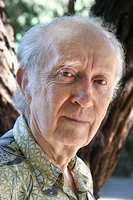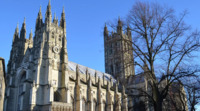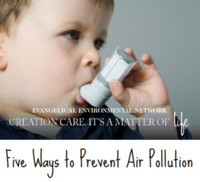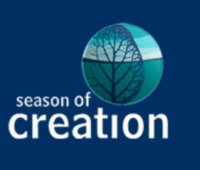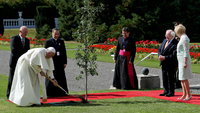Search
354 items
-
San Diego Creation Care Team Success Stories
Catholic Climate Covenant has created two short videos to discuss how different churches in the San Diego diocese in California have worked to be better stewards of God’s creation. The parish of Our Mother of Confidence in San Diego, California, has taken action to reduce water and energy usage while the Saint James Parish and Academy in Solana Beach, California, has implemented environmentally conscious projects and initiatives in their community. -
Podcast: Young Minds Big Questions – An Interview with Brian McLaren
“Climate Change and Christianity – An Interview with Brian McLaren” was released on April 26, 2017, and is the first part of a two part conversation on climate change and Christianity. The interviewee, Brian McLaren is an author, speaker, activist, and public theologian. His work as a pastor led him to begin writing, and he has published numerous books on faith and Christian life.
McLaren unpacks some of the science behind global climate change and its everyday effects for human life around the world. Looking at the dangers of a changing climate, he turns to faith as the inspiration for advocacy and change. Ultimately, McLaren attributes reluctance to accept or take action to prevent climate change, in part, to a certain kind of eschatology. He then mentions instances in which congregations, inspired by care for God’s world, made real changes to combat climate change. The podcast concludes with McLaren’s own recommendations for any Christian wanting to learn more about creation care. -
Dayton Divests
In June 2014, the University of Dayton became the first Catholic university in the United States to announce their divestment from coal and fossil fuels. Members of the university staff see this move as part of the university’s commitment to “being a responsible steward of the Earth’s natural resources.” This decision was commended by the president of the Association of Catholic Colleges and Universities. Their decision was one inspired by faith reflection as well as a commitment to financial stability for the university.
Beyond divesting from coal and fossil fuels, the university has taken further steps to move their campus toward efficiency and sustainability. The university now has two full time employees who work to improve campus sustainability and offers academic programs in these areas as well. The University of Dayton is also home to the Hanley Sustainability Institute. -
Pope Tells Oil Executives to Act on Climate: "There Is No Time to Lose’”
This past Saturday, the pope gathered leaders of the world’s largest oil companies for a closed-door conference at the Vatican. He commended oil and gas companies for progress made in developing more careful approaches to assess of climate risk and adjustments made to their business practices. However, these actions are not enough. Pressure has been building on oil and gas companies to transition to less polluting forms of energy, often coupled with the threat of fossil-fuel divestment.
The pope reiterated his call for a transition from fossil fuels “to a greater use of energy sources that are highly efficient while producing low levels of pollution.” He emphasized that the poor who would suffer the most from the effects global warming. And that we owe it to the poorer countries and future generations. -
Profile: John B. Cobb Jr.
John B. Cobb is an American theologian working in ecology and creation care. The prolific author of more than fifty books has argued inside the church and the academy for faith inspired environmental action. He began writing on faith and environmentalism in the 1970s and has remained a prominent activist and theologian through his life. In 2014, Cobb’s accomplishments were celebrated when he was inducted into the American Academy of Arts and Sciences.
Cobb and his students put together an early Ecotheology book list, current through 1991. Cobb’s speeches and works can be found online, and his books can be found at many major retailers and your favorite independent bookstore. -
Justice for Each Generation
Justice for Each Generation started with the landmark case, Juliana v. U.S. Twenty-one youth had filed a lawsuit against the United States government for its role in causing climate change and violating their right to life, liberty, and property, while also failing to protect essential public resources. They are calling for sermons from youth and adults of all faiths as a collective statement that sends a signal to the rest of society. -
Pope Francis and Environmental Leaders Forge Vision for Global Action
Environmental leaders, activists and advocates gathered with Pope Francis for a two-day Vatican-organized conference with hopes to emerge with a shared vision for protecting our planet. The conference was inspired by the third anniversary of the Pope’s encyclical and was attended by political and religious leaders, scientists, economists and heads of civil society organizations. Inspired by the call for unity and action in the encyclical, UN Environment also introduced their Interfaith Rain-forest Initiative at the conference. -
Church of England to Divest from Companies that Neglect Paris Agreement Goals
The Church of England will divest its $16 billion fund from companies that are not aligning themselves with the goals of the Paris Agreement. The decision, which passed by a majority of 347 to 4 votes, states that the church will sell its stakes in companies that do not taking steps towards climate goals by 2023. The website of the Church of England offers the following message: “We believe that responding to climate change is an essential part of our responsibility to safeguard God’s creation. Our environmental campaign exists to enable the whole church to address—in faith, practice and mission—the issue of climate change.” -
Divest and Reinvest Central
GreenFaith has created a list of known religious efforts to divest and reinvest from fossil fuels. The list includes religious groups that have: divested their own funds, committed to never investing in fossil fuels, passed or considered national or local resolutions, focused on reinvestment, or taken divestment or reinvestment on pension funds. -
Five Ways to Prevent Air Pollution
Evangelical Environmental Network Moms (EEN Moms) provide this information sheet, urging individuals to take action in areas that might seem overwhelming and/or too difficult to change. This message by EEN Moms focuses on air pollution. Small action/steps taken by everyone can add up to make significant changes to the quality of air for our planet. -
Leadership Meeting Guide – Breathe Free and Easy
Evangelical Environmental Network MOMS strive for pollution free air for everyone around the globe. They believe that clean air is a fundamental gift from God (Genesis 1). Even in the United States, there are still people fighting for clean air. This resource provides a video and discussion questions about how mothers can make a difference and advocate for healthy, clean air for all. The guide can be downloaded for easier use at meetings as well. -
10 Eco-Mission Projects
Evangelical Environmental Network MOMS has created a list of family oriented service projects that focus on the environment. These ideas not only offer ways to serve the community, but also take care of God’s earth in simple but effective ways. -
Creation Care Hack: Energy Efficiency at Home and Energy Efficient Kits
One of the most effective ways to alleviate the impact of carbon emissions on the planet is to reduce individual energy usage. Evangelical Environmental Network has created a resource guide that provides practical tips and suggestions to decrease energy output. It also includes ways to create energy efficient kits that can be distributed at churches or used as part of a mission project. -
Season of Creation Week 2: Climate Change: A Challenge, Our Concern
For each week of the Season of Creation, the World Council of Churches offers a resource for celebrating creation. The second week of the Season of Creation is focused on climate change and the challenge of responding to Pope Francis’ call to care for creation. This document contains a hymn, a call to repentance, a responsive reflection, and an intercession. -
Season of Creation Calendar 2018-2020
The Uniting Church in Australia, Synod of Victoria and Tasmania has put forth a revised Season of Creation Calendar that is more inclusive of traditions and cultures from both domestic and international faith groups. In addition to the calendar dates, a calendar statement is included, calling for an ecological conversion along with a celebratory message of "Creation Day." -
Canadian Ecumenical Document Embraces Christian Concern for Environment
On July 23, 2019, the Roman Catholic-United Church of Canada Dialogue in Canada released "The Hope Within Us," a document that focuses on climate change and ecological degradation. The statement urges Christian churches to put aside their differences and work in communion to acknowledge the downside of progress and greed of our economic and political systems as they negatively impact our environment. -
Prayers of the Faithful
Prayers of the Faithful is a selection of Catholic prayers from Season of Creation that can be used during mass or other religious services for the Season of Creation Month. The following is an excerpt from one of the prayers:
"United by our Catholic faith and respect for all life, including the life of unborn generations,we pray that the human family takes action to transition to clean energy and keep climate change in check. Let us pray. With a shared sense of responsibility to care for God’s beautiful, live giving creation, we pray that the goals of energy transition, reduced global warming, and protection of life for all are attained. Let us pray." -
Irish Bishops Announce Divestment from Fossil Fuels Ahead of the Pope's Visit
The Irish Catholic Bishops Conference announced it would divest from fossil fuels hours before the arrival of Pope Francis. The bishop's move means withdrawing investments in 200 oil and gas companies within five years. The bill was introduced in the Irish Parliament, requiring the country’s sovereign wealth fund to divest from all fossil fuels. If the Irish bill passes, it will make Ireland the first government to divest from fossil fuels. -
Season of Creation Event Planning
The Season of Creation is a great time to introduce environmental themes by holding a prayer service, planting a tree, advocating for change, or simply holding a conversation about the Christian responsibility to Creation. Examples of available resources offered include: Prayer and Worship, Hold an Education or Sustainability Event, and Participate in a Campaign. -
Columbus Catholic School becomes Designated GreenSpot School
The GreenSpot School designation indicates that a school has taken initiatives to educate their students and staff about sustainability, water issues, conserving energy, reducing waste, and green transportation. St. Mary School Catholic school has become the first in Columbus to earn this designation. They have implemented a recycling program, local garden, and composting, which qualified them to become a GreenSpot School. They have created a short video of students discussing their engagement and staff discussing the impact of becoming a GreenSpot School. -
Caring for Creation Using LED Lights
Since the release of Laudato si’, many Catholic churches have made caring for creation a priority. About a year ago, the Catholic Diocese of Columbus started The Creation Care Team to help in their task of caring for creation. Their main role is to promote the church’s teachings on care for creation and in particular how it was articulated in Laudato si’. They assemble groups of people with specific initiatives who work on spreading awareness, educating, and developing practical ways for Catholics to live. While their work has impacts that spread far and wide, one distinct person who has made a difference is Bruce Boylan, the Director of Facilities for the Catholic Diocese of Columbus.
Around a year ago, Bruce and his team started looking for ways to help Catholic schools in the area reduce their energy costs. They came upon the idea of LED lights and obtained a few samples that were first tried in the cafeteria of St. Mary’s church. An example of the difference between a normal fluorescent bulb and an LED bulb can be seen below. They found that there was a significant improvement in lighting and cost, but the payback time took about nine months. The problem was in that nine months; if a parish or school did not have the money to invest right away, then nine months was too long to wait for saving money. Along with the payback time being delayed, the price of the LED bulbs were about sixteen dollars apiece and they were difficult to install. All these problems were holding them back, until they found a local realtor.
Late last year, they found a local realtor who was selling LED bulbs for six dollars apiece and they were much easier to install. With this new price, the payback time was reduced from nine months to only three and a half months. With this lower price and easier installation, these bulbs caused a 73% reduction in an energy bill for lights after just three and a half months. The math done to calculate these figures can be seen below. Now, the idea of LED lights became much more plausible for everyone.
Bruce placed his first order for 500 LED bulbs to replace the lights in the Catholic Diocese building in Columbus. The cost was 3,000 dollars and they have an expected rebate of 1,500 dollars. Even without the rebate, within three and a half months they will be saving enough money to make the purchase worth it. After the increase of confidence in these bulbs, they started to spread the word to buildings across the area. Schools have the highest interest because they have the most to gain. They have an immense need for lighting and have their lighting in use more often compared to parishes and other buildings. A school in the area has recently placed an order for 100 LED bulbs to sample. They found them to be well worth it and have since placed an order for 400 more bulbs. The success of these LED bulbs is astronomical and with the continued work of Bruce and The Creation Care Team, it will only continue to grow. -
GreenSpot and St. Mary School
GreenSpot was founded in 2008 by former Columbus Mayor Michael Coleman as a place where people of the city can go to learn how to live, work, and commit to being green. Becoming certified as A GreenSpot is open to anyone from households, to businesses, to community groups. There are a list of commitments that must be made depending on the type of organization, but once they are met the application process can begin.
Recently, on January 30th, Columbus St. Mary School became a GreenSpot. The conversation first started in October of 2016 with Rebecca Mellino and the GreenSpot program. Between October of 2016 and January of 2017, members of GreenSpot, and Jerry Freewalt, head of the Catholic Creation Care team, came and spoke to the students about the program. Once the students became engaged and excited about the program, the school has had no difficulties keeping up with the responsibilities.
The students recycle and compost after breakfast and lunch. They rotate during recess and walk through the halls collecting the recyclables into bigger recycling bins. It is more than just the students that have gotten involved though. Teachers were given information on how to teach the different grade levels on how being green related to each of the students. Additionally, the staff members take turns delivering the recycled materials from the school to a drop off at Kroger about four times a week. Parents play an essential role as well, as they pitched in to buy small recycling bins for the classrooms and bigger bins for the cafeteria. The school also has plans to start a garden next to their building. Once it is built, they will have Boy Scouts, 4-H groups, and Night to Columbus to help care and maintain for the garden.
Christina Hickey is an art teacher at the school who is also in charge of marketing. She spearheaded the GreenSpot program and got staff members and students involved. The school’s student council is comprised of 4th through 8th graders that meet once or twice a month to talk and help out with recycling. Stepheny and Stephen are 6th grade student council members at St.Mary school who both recycle and compost at home. When interviewed, they both stated that they’re excited about the garden that is going to planted next to their school. Rose, a 4th grade student council member, was asked what it means to care for God’s creation and responded by saying “It’s really important. He made this for us. I don’t think we should trash it. I think we should cherish it.” Along with making the school a greener place, this program has made lasting impacts on students as well. Eayual, an 8th grade student council member that helps out every day stated that everyone should “think of the Earth as your life, take care of our life and don’t slowly destroy it.” He plans on attending Bishop Hartley high school where he aims to get students involved in recycling and caring for the Earth there as well.
Additionally, Christina Hickey who lead the GreenSpot initiative at St.Mary School can be reached at chickey@cdeducation.org for information on how to implement this program. To keep updated on St.Mary School and GreenSpot, follow their Twitter accounts at @stmaryschoolgv and @greenspotcbus. -
The Diocese of Southern Ohio: Earth Day Video
Reverend Thomas Breidenthal, Bishop of The Diocese of Southern Ohio gave an Earth Day message from a butterfly garden by St. Johns Town street in Columbus. He reminds the audience of the privilege and responsibility that comes with caring for the earth, noting also that Earth Day is the only secular holiday that is observed around the world. -
Earth Day statement from ELCA presiding bishop
The Reverend Elizabeth A. Eaton, Presiding Bishop of the Evangelical Lutheran Church in America (ELCA), issued an Earth Day statement on behalf of the ELCA. A salient excerpt from the statement is shown below:
"The effects of the warming climate are felt in nearly every corner of the globe. These include increased migration, food insecurity due to changing agricultural landscapes, national security issues and health problems. As bad as it is for all creation, the most vulnerable people around the world are suffering the most. Yet they have contributed the least and, as noted in the United Nation's 2030 Agenda for Sustainable Development,[iii] are ill equipped to adapt to or mitigate the effects of a changing climate to build resilient communities." -
Presbyterians and Climate Change
This article posted on Yale Climate Connections discusses grassroots efforts of Presbyterian organizations, and notes specific time frames of salient Presbyterian accomplishments with regard to climate change. The following excerpt provides a general overview of their goals and mission:
"Presbyterians are engaged in many activities to combat climate change, from Earth Forums to hunger programs addressing food and climate crises and protests against practices that encourage reliance on coal. Since 2010, the Presbyterian Church has given 80 congregations an Earth Care Congregation Certification for demonstrating a strong commitment to environmental care."





